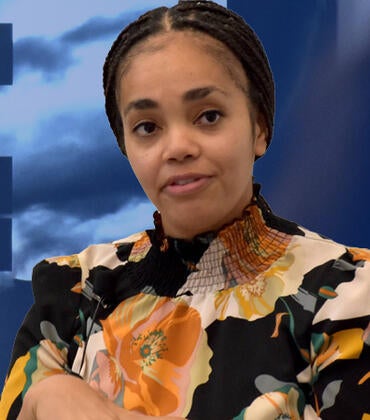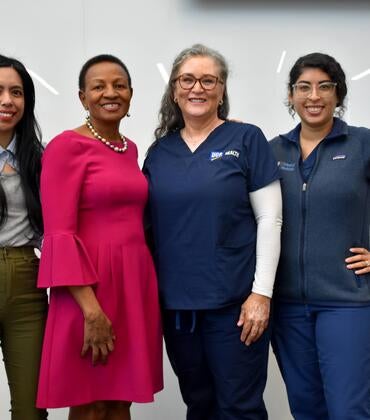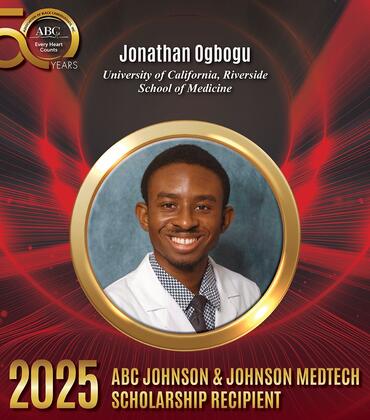
The UCR School of Medicine recently announced the 2025 winners of the Dean's Postdoc to Faculty Program Award. The award aims to support emerging principal investigators at the UCR SOM with the goal of developing independent academic researchers. Specifically, the award provides up to 50% of each winner’s salary for two years along with funds to attend one research conference in the U.S. per year.
Reflecting the SOM’s commitment to diversity, the program encourages applicants who are underrepresented in biomedical, clinical, or population research.
The 2025 winners, whose awards started October 1, were Priti Prasanna Maity, PhD, a postdoctoral fellow in the lab of Declan McCole, PhD, professor of Biomedical Sciences; and Nancy Herrera, PhD, a postdoctoral scholar in the Department of Psychiatry and Neuroscience.
Priti Prasanna Maity, PhD

What attracted you to the UCR SOM?
I was drawn to the UCR School of Medicine for its strong emphasis on translational and interdisciplinary research aimed at improving human health, particularly through innovative disease modeling. Before joining UCR, I learned about Dr. Declan McCole’s lab and its pioneering work using gut-on-chip technology for intestinal disease modeling and drug screening to investigate the mechanisms underlying inflammatory bowel disease (IBD) and colorectal cancer (CRC). This research focus closely aligns with my interests and provided an ideal opportunity to contribute my expertise in organoid biology and epithelial differentiation to advance physiologically relevant gut models.
What is your research program and how does it contribute to the mission of the SOM?
My research focuses on developing advanced, human-relevant intestinal models that replicate the complex cellular and molecular architecture of the gut. Under the mentorship of Dr. Declan McCole, my work integrates iPSC-derived organoids and gut-on-chip systems to uncover mechanisms of epithelial repair and regeneration, elucidate the roles of rare intestinal cell types, and model diseases such as IBD and CRC. By accelerating translational discoveries and reducing reliance on animal models, this research directly supports the UCR School of Medicine’s mission to advance biomedical innovation and improve human health through the development of physiologically relevant platforms for precision medicine and therapeutic testing.
How will this award help you reach your academic goals?
The Dean’s Postdoc-to-Faculty Award will be instrumental in helping me transition toward an independent faculty career. It will provide the resources and mentorship needed to strengthen my publication record, expand my technical expertise in gut-on-chip and immuno-epithelial modeling, and establish independent research directions aligned with UCR SOM’s priorities. This support will also enable me to develop competitive proposals for NIH K-series and R01 grants, foster interdisciplinary collaborations, and mentor junior trainees — all essential steps toward building a sustainable academic career in translational biomedical research.
Nancy Herrera, PhD

What attracted you to the UCR SOM?
I first became interested in my postdoc position and the SOM generally thanks to Dr. Kimberley D. Lakes. Since my doctoral studies, I have wanted to focus my research on addressing the well-being of historically oppressed children and their families. Her passionate advocacy for children’s mental health and development has supported my growth as a clinician and researcher. Specifically at the SOM, I appreciate and am moved by the values to support individuals and families in their journeys in health, well-being, and healing. The School of Medicine aims to increase access and improve the health of communities in the Inland Empire, which aligns with my commitment to support Spanish-speaking, immigrant, and Latino communities in California through culturally validating mental health interventions.
What is your research program and how does it contribute to the mission of the SOM?
I am a mental health provider, researcher, and advocate for the health and well-being of historically marginalized children and families. As a bicultural/bilingual clinical researcher, I am committed to advancing access to high-quality care for underserved communities through culturally congruent and accessible mental health services. I bring such passion to my current role in overseeing Dr. Kimberley D. Lakes' R33 grant (Agency for Healthcare Research and Quality; 2024-2027), Digital Health Intervention for Children with ADHD. The AHRQ Digital Health Intervention, the CoolCraig+ParentCoach System, is a smartwatch app for children with ADHD (CoolCraig) and a smartphone app for their parents (ParentCoach).
How will this award help you reach your academic goals?
My postdoctoral position influenced my interest in the cultural adaptation of digital health interventions for neurodiverse Latino children and their families. As a recipient of the Dean's Innovation Award, I am linguistically and culturally adapting ParentCoach with the support of promotoras (cultural health workers) in the Inland Empire. The UCR Dean’s Postdoc to Faculty Program will help further my development as an independent clinical researcher in evidence-based mental health interventions for Latino children and families. As the 2025-2027 Dean’s Postdoc to Faculty program recipient, I am to (1) develop a comprehensive understanding of cultural and linguistic adaptation of evidenced-based Digital Health Interventions for Latino families; (2) expand my cultural and linguistic adaptation of ParentCoach by including CoolCraig and recruiting bilingual mental health providers and Latino immigrant families, thereby culturally adapting the CoolCraig+ParentCoach system; and (3) bridge my scholarly work on Latino mental health research to include evidence-based interventions among Latino children with ADHD. I aim to devote my career to improving the well-being of historically oppressed children and families through clinical research, mental health services, and student mentoring.



